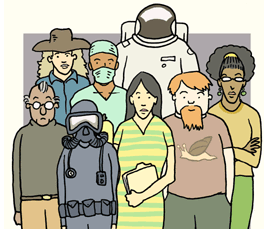 In this section, we’ve seen that science is a community endeavor. Contrary to the stereotype of solitary lab work, scientists frequently interact with colleagues to collaborate on projects, review each other’s work, share information, and brainstorm new ideas. In these interactions, scientists work to maintain a set of cultural norms and expectations: scrutinize ideas, be honest, give credit where credit is due, and work within the ethical guidelines of the community. The scientific community contributes to the progress of science in many different ways, from providing checks and balances to facilitating specialization — and all of those functions are furthered by a diverse scientific community. Science simply works better when lots of different sorts of people participate in it!
In this section, we’ve seen that science is a community endeavor. Contrary to the stereotype of solitary lab work, scientists frequently interact with colleagues to collaborate on projects, review each other’s work, share information, and brainstorm new ideas. In these interactions, scientists work to maintain a set of cultural norms and expectations: scrutinize ideas, be honest, give credit where credit is due, and work within the ethical guidelines of the community. The scientific community contributes to the progress of science in many different ways, from providing checks and balances to facilitating specialization — and all of those functions are furthered by a diverse scientific community. Science simply works better when lots of different sorts of people participate in it!
To see the counterpart of all this and find out how the broader community influences science, read on…
